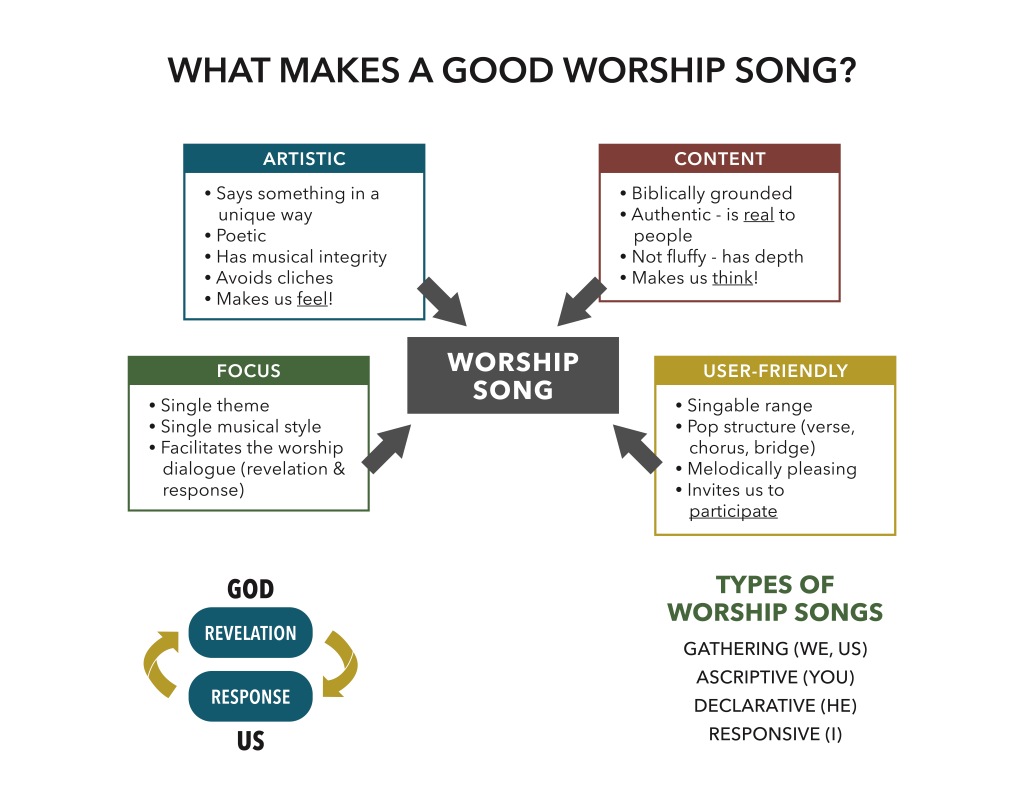What Makes a Good Worship Song?

I’ve had the privilege of speaking at a good number of worship conferences, workshops, podcasts, etc., over the years, as well as lead an amazing group of worship leaders, bands, and congregations at my church for decades. And one of the ongoing dialogues I’ve had in all these situations is: What makes a good worship song?
Interestingly, I’ve never blogged on this subject. I guess I’ve been trying to avoid the opinionated online weirdos (and there are many!). But I thought I would finally share some of the things I’ve learned, because: (1) there are a million worship songs out there now, which is great but also confusing; and (2) I see worship leaders sometimes choosing songs for all the wrong reasons. It’s not enough that the song sounds hip, or has a memorable hook, or makes your voice sound cool. Good music is more than just personal opinion. We need criteria that can help us sift through the myriad of worship songs, to find the ones that best serve your particular worship community.
A caveat. This is just my opinion. I very humbly assent that I can be wrong, or incomplete, or askew. But it’s been my experience that this teaching has helped a lot of people, particularly worship leaders, think through their worship as they give their best to the Lord. I hope it might help you too.
A WORD ABOUT WORSHIP SONG TYPES
Before I get to the criteria, I thought I would share what I consider four different types of worship songs. Each type has it’s place and function in worship. And I think it’s important to understand these, because I think the right song in the wrong place can sometimes hinder worship, not encourage it. It’s a lot more than just going from fast songs to slow songs.
GATHERING songs are typically songs used at the beginning of a worship time. Lyrically, they help focus people to be on the same page thematically, emotionally, and spiritually, and remind us that we are the people of God, gathered for His glory. Gathering songs typically use “we” and “us” as the predominant pronoun. (Example: “Hands to the Heavens”/Jobe, Ingram, Brown, Brown.)
DECLARATIVE songs worship God by reminding us of who He is and what He has done for us. They speak of His glory, or His saving acts. The predominant pronouns for these songs are “He” or “His.” (Example: “Jesus Messiah”/Tomlin, Carson, Reeves, Cash.)
ASCRIPTIVE songs directly tell God who He is. They ascribe glory, honor, and character to God. These are predominantly “You” songs. (Example: “What a Beautiful Name”/Ben Fielding, Brooke ligertwood.)
RESPONSIVE songs are songs which are typically more personal in nature, and are a response to God, either to His truth, His grace, or simply His presence. Responsive songs are predominantly characterized by the pronoun, “I.” I’ll typically put responsive songs at the end of worship sets, because I think people have more opportunity to respond to God after a time in His presence. (Example: “Holy Water”/Bergthold, Cash, and more Cash.)
Often times, a song will have more than one function. For example, the song “Great Are You Lord”/Ingram, Jordan, Leonard begins in the verse as an ascriptive song, but beautifully answers as a responsive song in the chorus. Songs like these help to encourage the worship dialogue of Revelation and Response, and take the worshiper on a worship journey. So there are many, many exceptions to the “rules” here. But just be aware that different songs can be used for different purposes, all within the context of a corporate worship experience.
FOUR CRITERIA FOR WORSHIP SONGS
Once again—in my humble opinion—there are four criteria to consider in selecting congregational songs for worship (in no particular order): Artistry, Content, Focus (or Theme), and User-Friendliness. A good worship song has elements of all of these criteria.
CONTENT It cannot be overstated that worship songs need to be Biblically grounded. Because our congregations form their theologies as much by the words they sing as by the sermons they hear. Believe it or not, there are popular worship songs that I won’t use because there are theological inconsistencies in the lyrics that I feel uncomfortable with. But beyond being grounded on a foundation of the Word of God, lyrics must also be grounded in reality. For we live in a messy world, one that is deep and often complicated and sometimes gray. We are called to worship from real life. So we don’t need superficial or unrelatable lyrics. We need content that people can connect to, internalize, personalize, and sing with integrity. Having words that are both relatable to who we are, and true to who God is. A Content-Rich worship song is one that makes us think.
ARTISTRY This being a blog about faith and arts, it should come as no surprise that this is one of the criteria. Songs are creative expressions, and hence should reflect some aspect of craftsmanship and artistry. Songs should say something in a unique way, avoiding the cliches (e.g., rhyming “love” and “above”) or lyrical fluff (e.g., using the word “just” as an adjective). While the words of the Psalms are timeless and ever true, songwriters should strive to find the new, fresh, poetic language that makes the truth of God come alive in their songs. And this is also true for the musical content as well. Songwriters should strive for creativity in arrangement, groove, melody, and chord progression (hopefully something beyond the standard I-IV-V cliches). Also, the lyrics and the music must complement one another for greatest emotive impact. Above all, an artistically well-written song makes us feel something—joy, hope, majesty—and in doing so, helps take us to the throne.
FOCUS Occasionally, I will come across a budding songwriter who is trying to stick the entire Bible into a single song. And in doing so, we lose sight of what we’re trying to express. A good worship song focuses on a single theme, and has a single musical style which complements that theme. It can be lament or joy or a particular Scripture passage, but a good worship song draws a congregation together through a single universally-relatable idea. Scattered, sloppy, or overly complicated songwriting will confuse people. Remember that worship is a dialogue—between us and God—and as such, the Focused worship song helps us as congregations move in the same direction in that dialogue.
USER-FRIENDLY We have to remember that most people aren’t musically trained or sophisticated, and some people actually have physical limitations related to singing. So a good worship song takes some basic considerations into account. It should be in a singable range for the majority of people. It stays within conventional pop structure (e.g., verse, chorus, bridge) so your roadmap isn’t confusing. And it should be melodically pleasing, with enough of a hook that invites the singer to sing, and sing again. In short, the User-Friendly worship song invites us to participate.
WHERE TO GO FROM HERE
Over the course of my three decades of ministry, I’ve sung literally thousands of worship songs, many good and memorable, and some less so. And over time, I’ve seen my congregation molded by these songs—both as individuals and as a community of worshipers. Obviously, song selection is important. But how to go about it?
Have a Listening Party. In my church, I’ll sometimes invite people together to have Listening Parties—where people will bring potential songs to sing at church, and we will listen to them and discuss their merits using these criteria. Some great songs have come out of these parties, and the participation creates greater ownership among your people.
Get your pastor(s) to review your lyrics. Or if not your pastor, someone who is theologically astute. There’s a danger though, in that lyrics are poetry, and some theologians lean a little too hard into literal interpretation. The point is to have a second set of eyes looking at the meaning of your lyrics to ensure it says what you want your congregation to sing and believe.
Don’t Be Afraid to “Sit” a Favorite Song. If you’re a worship leader, you have favorite songs. But most songs have a lifespan, and I think it’s important to evaluate your song list and thin it out occasionally. You need to be able to do this objectively of course, so the criteria can help in this regard. Generally, it can be a good thing to let a favorite song lay fallow for a season.
Do you have other criteria that you use to select worship songs? Do you write worship songs yourself? What do you do to ensure good worship music? Let me know in the comments.
Want to read more? Here’s a Top 10 List of Blog Posts About Worship.
[Banner photo by Javy Luzania on Unsplash.]













